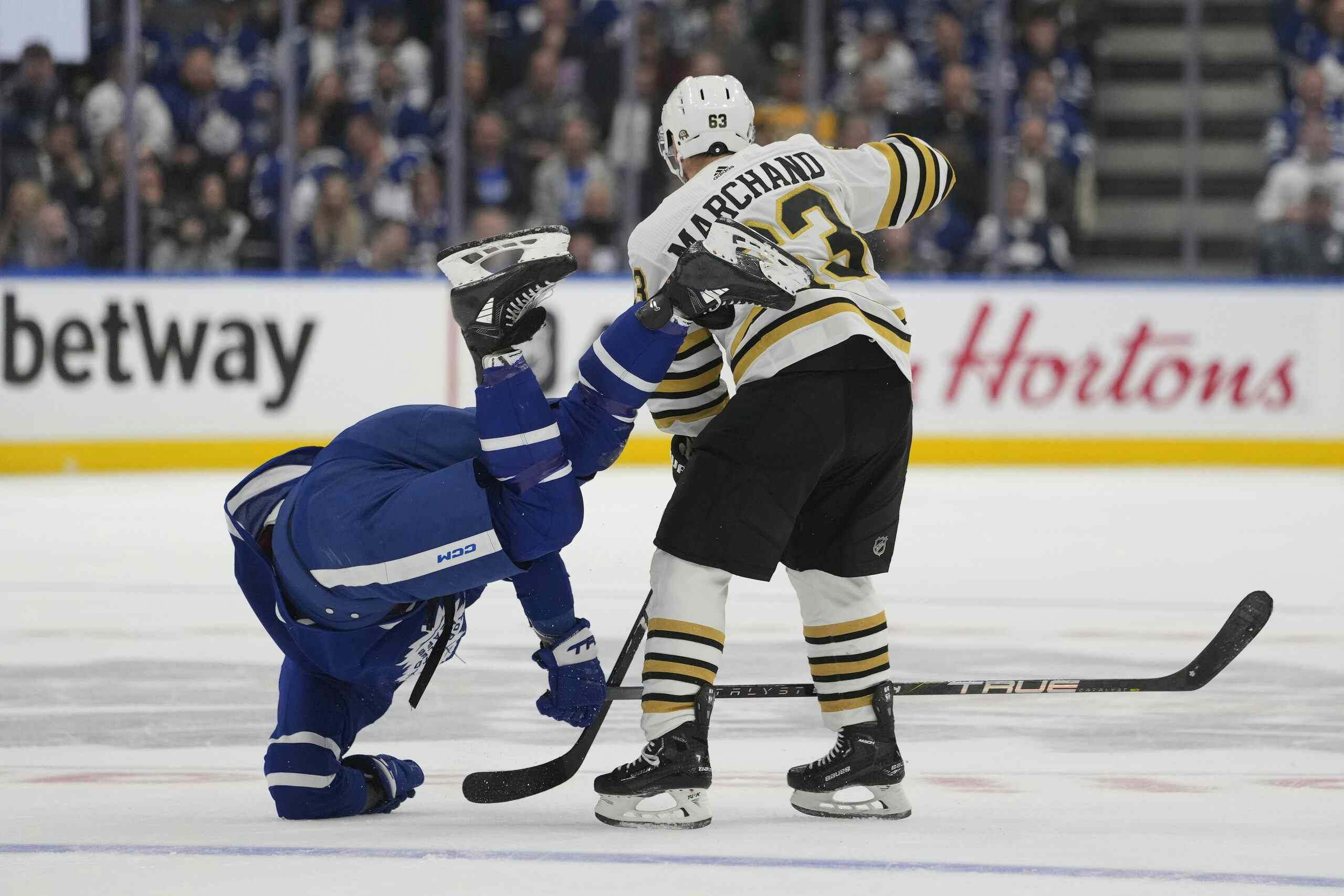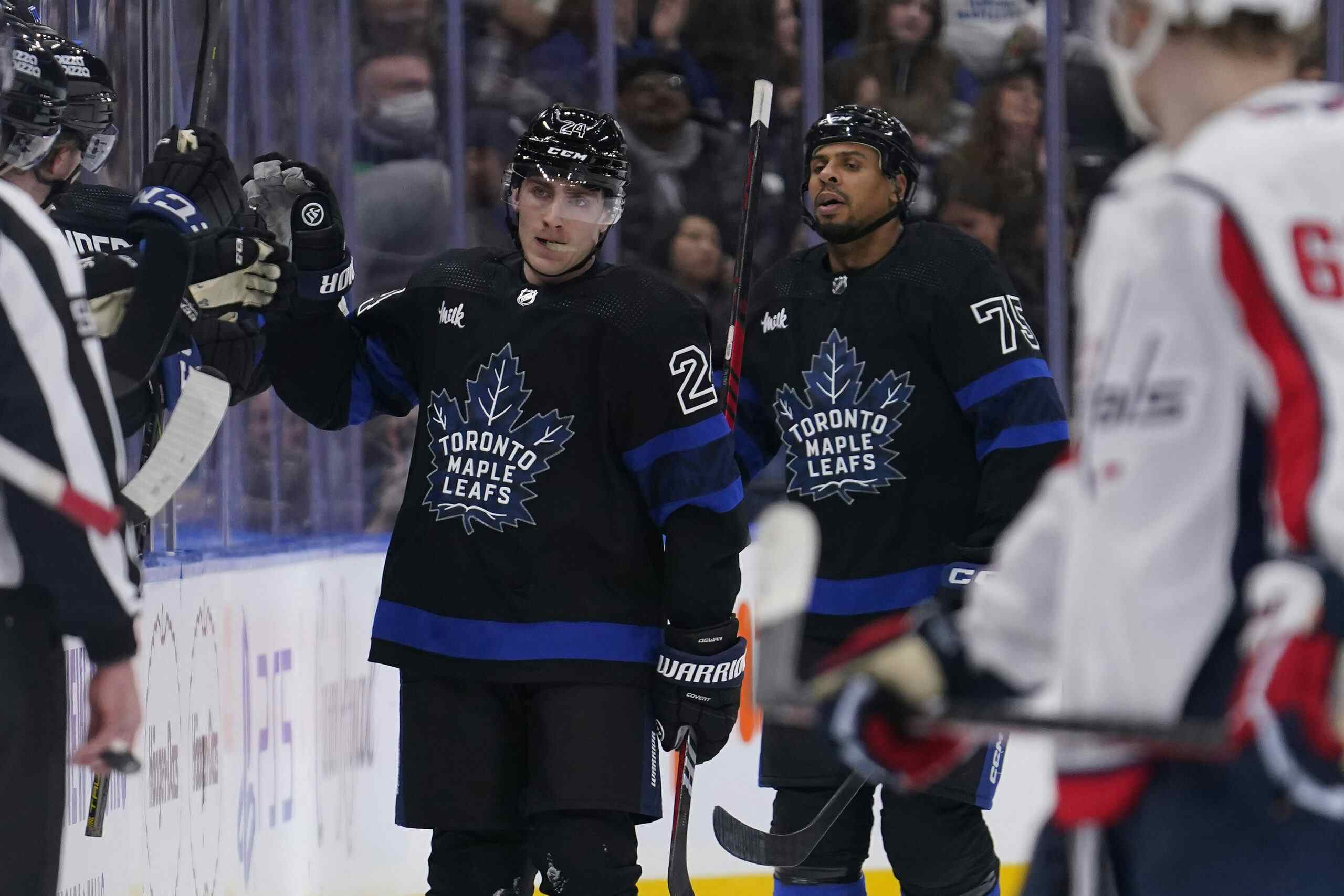How the Leafs are reaping the benefits of their Calle Rosen gamble

Minutes after leading the Toronto Marlies in a cool-down stretch after Tuesdays practice at Coca-Cola Coliseum, Calle Rosen was set to meet with the media to discuss the two-year contract extension he just signed with the Toronto Maple Leafs –but before Rosen could even dive into it with a pair of reporters, veteran forward Rich Clune swooped in.
“Show me the money,” a grinning Clune sang as he passed by Rosen.
It’s a big deal around these parts to see someone like Rosen, the teams best defenceman, earn a two-year, one-way contract from the Maple Leafs. Rosen’s been a workhorse for the Marlies all season long and you could even make the case that he’s been the teams MVP this season.
“I’ve seen ice-time from that guy—he’s playing 50 minutes a night,” Rasmus Sandin said, tongue-in-cheek.
While Rosen’s game at the AHL level has been highlighted by some offensive flashes–with 19 points in 25 games—his point totals are hardly the sole reason why Rosen earned a two-year, one way contract with an AAV of $750,000 with the Maple Leafs.
Rosen can do it all.
“He’s a good all-around player. He plays power play, he plays penalty kill, he plays 5-on-5, he plays in every situation out there and he does it with a lot of confidence,” said Rasmus Sandin. “It’s a lot of fun to see out there.”
Complementing his versatility is a wide-ranging skillset highlighted by his smooth skating, slick hands and defensive instincts. Be it at even strength where he faces top competition, or on both special teams units, Rosen has been leading the charge for the Marlies this season.
Yet, for Rosen, the journey to becoming a force at the AHL level, and eventually earning an NHL contract, didn’t happen overnight.
After signing on the dotted line with the Maple Leafs in the summer of 2017, Rosen made the Maple Leafs out of training camp. His stint in the NHL didn’t last long, as Rosen only treaded water for four regular season games at the NHL level as he looked overwhelmed and out of place in the limited NHL action he saw. The speed of the game, and the size of the rink was much different than what he was used to seeing in the SHL.
So, he was sent to the Marlies.
While Rosen, who was courted by the Leafs the previous offseason and was promised NHL opportunities, was upset about the demotion, he quickly started to look at the positives that it could provide him. He didn’t sulk, nor did he seek a way out of North America to return to playing overseas. He embraced the opportunity, and accepted the fact that he needed to work on his game
“In some way, I felt it was good to come down and get a lot of ice-time, down here,” Rosen said.
Life in the AHL wasn’t all smooth-sailing from the get-go, for Rosen. Last year, the Calder Cup winning Marlies were stacked on the blue-line–with the likes of recent graduates Martin Marincin, Justin Holl and Travis Dermott—making it even harder for Rosen to earn ice-time as he tried to build back up his game, and his confidence.
Once the second half of the season came, though, Rosen started to get the hang of things. Once the Calder Cup playoffs came along, Rosen was a big part of the Marlies blue-line as he played alongside Vincent LoVerde on a pairing heavily deployed by Keefe.
His showing through the second half of last season and the Calder Cup Playoffs was enough to show Sheldon Keefe that he was ready to be relied on as a number one defenceman, the following season. Rosen’s playing style–which relies on carrying the puck and pushing the pace –is exactly what the Maple Leafs are seeking on their backend. Because of that, Keefe set out a plan similar to what he drew up for Travis Dermott the year prior.
The plan was focused on getting Rosen plenty of ice-time in crucial situations. Furthermore, it was focused on working on the areas of his game that he’d need to master if he wanted to move on to the NHL level.
“I felt like Rosy was ready for it,” Keefe added.
Keefe knew the talent was there and that the only thing holding him back from untapping the potential was opportunity. With Holl, Marincin and Dermott moving onto the next level, a chance arose for Rosen to take that next step.
“It was sort of a natural evolution for him, this season, to kind of take [his game] to the next level,” said Keefe.
And not even halfway into his second AHL season, Rosen proved enough to earn himself that two year extension. While there is no guarantee Rosen will be able to excel at the NHL level, there’s a great deal of confidence amongst the Marlies brass that he will. Rosen understood, right from the get-go, that he had to be able kill penalties if he wanted a shot to move up the ranks.
“It’s one thing i need to be better at,” Rosen said, understanding that penalty killing is almost a pre-requsitie to join a Mike Babcock coached team, from the minors.
Rosen’s encouraged with the opportunity to kill penalties, as he saw what he did for teammate Travis Dermott last season.
“It shows that they believe at me,” Rosen pointed out.
Rosen’s game, which revolves around his smooth skating and ability to push the pace, is tailored to the type of defenceman that Maple Leafs general manager Kyle Dubas wants to round out his lineup. Sure, there’s a chance Rosen flops at the NHL level, but that can be said for anyone. But with a mere $750,000 cap hit for the next two seasons, outweighs any risk for a soon-to-be cap-constrained Maple Leafs.
On a grander scale, though, the signing of Rosen, and furthermore the plan in which the Marlies designated for him and how they helped round out his game–serves as a reminder for the entire team.
“You’re part of a process and a plan that extends beyond just the 23 guys that happen to be on the NHL roster,” said Keefe.
With the leafs signalling that Rosen will be given every opportunity to be a part on the teams blue-line, the real work starts now, for Rosen.
“It’s up to me now to prove to them too that I’m able to play there,” said Rosen.
Recent articles from Jacob Stoller





